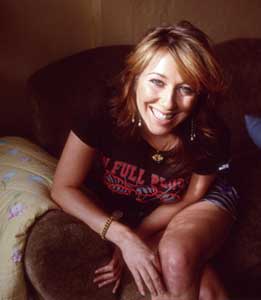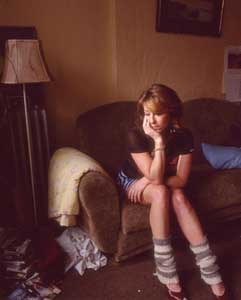Arts & Entertainment
Martha Martha Martha!
Published Thursday, 14-Apr-2005 in issue 903
With a chorus of “ah, ya bloody motherfucking asshole…” Martha Wainwright’s pissed-off ode to her father, “B.M.F.A.,” (they got in a fight, she immortalized her sentiments) isn’t quite poised for Top 10 radio/chart status. Yet the musical Wainwright clan – parents Loudon III and Kate McGarrigle, their children Rufus and Martha – never really meshed much with mainstream American tastes or uptight morality. Martha Wainwright (Zoe/Rounder Records), the Canadian 28-year-old’s self-titled debut LP, is compelling evidence that musical talent is a genetic trait. Songs like the catchy “Factory,” wistful ballad “Don’t Forget,” hypnotic “TV Show,” and epic “Far Away” boast a gorgeous sense of melody, powerful yet pixie-esque vocals, revealing lyrics, rich instrumentation and generous gobs of ’70s-era Fleetwood Mac rock-folk influence.
Prior to her full-length debut (and EPs, including January’s Bloody Mother Fucking Asshole), Wainwright had toured with and appeared on her family members’ albums. She also appeared on discs by Linda Thompson, Gordon Gano, The Meanwhiles and Geoff Muldar; she played a torch singer and crooned “I’ll Be Seeing You” in The Aviator; and she recently performed alongside fellow singer/songwriters Antony, Beth Orton, Jarvis Cocker and her brother Rufus, mom Kate and aunt Anna McGarrigle in an all-star Leonard Cohen tribute in Sydney, Australia.
But enough exposition. Martha’s darn good fun in conversation. Here we discuss/dish about her album, her family name and her brother’s taste in men…
Gay & Lesbian Times: Being raised in such a musical family, did you feel pressure to make music as well?
Martha Wainwright: I felt a lot of pressure from myself to try and [be different] from my family by going to acting school and not pursuing music too heavily as a teen – except to sing at the top of my lungs in my bedroom. Then I felt the pressure within myself [to do music]. It seemed a necessary step to take because it was the only thing I was any good at. So from my family, no. I didn’t feel any pressure. It was more about me accepting my fate. Swallowing the silver spoon placed in my mouth and accepting that this was something I could do and probably a true calling I should take more seriously.
GLT: Did you have any difficulty in finding your own voice? Any desires or fears to be another Rufus?
MW: I don’t think anyone could be like Rufus or any other descendant of ours. I think that it was so important to be your own person and etch out who you are in my household that I probably made efforts to be different and listen to different kinds of things. When Rufus was blaring opera or banging on the piano, I was probably disturbed by it and gravitated towards other kinds of music.
GLT: Were you inspired to write a song about Rufus’ big, messy crystal meth period?
MW: Underneath the crystal lies a deep drawer filled with other things. I was right with him a lot of that time. But I wasn’t aware of the crystal thing.
Was I inspired to write about that? When he first went into the [rehab] program, I wrote a song about “I love you and take care of yourself.” I didn’t turn it into anything I perform now. But [personally] I was inspired to drink less and do fewer drugs myself. I didn’t want to go on the program. It was good for everybody in my family. We all have a little bit of the Irish in us.
GLT: How long did it take to make this album?
MW: It took a long time because nobody would sign me and nobody would produce me, because I didn’t have a record label or any money. I had a band and knew a lot of musicians and I met this guy, Brad Albetta, who had a studio. He let me do it there on spec but it took a long time because we would use the studio when it was available.
GLT: Did the Wainwright name help you out in any way?
MW: My name gets me in the door and then out of the door. Oftentimes you walk in the front and out the back. Although people would take meetings with me or my phone calls, that doesn’t mean anything.
GLT: What was your childhood like?
MW: In many ways it was idyllic. We lived in a great big Victorian house in Montreal with a lot of green space and fun. But I think Rufus tried to kill me all the time. Scary.
GLT: When did you find out that Rufus was gay?
MW: Pretty early on. I always tried to not draw too much attention to that. When he came out it was hard for him because mom was difficult and dad was difficult and it was a difficult subject. I wanted to be the person who didn’t think it was a big deal. I remember being younger than him and knowing he was into boys… having an image of him fucking a guy and thinking I don’t want that image in my head. Let’s not focus on that. Now I think that’s funny.
GLT: Did you ever question your own sexuality?
MW: I think I like cock – sorry. Like all girls and their teen years, as a teenager I kissed girls. I had sex with girls. But no, I’ve always been pretty straight, I think. It’s just totally this sort of thing where I’m a total victim. Big, strong men make me feel uncomfortable and shy and under someone’s thumb and I like that.
GLT: What do you think of Rufus’ taste in men? And do you share it?
MW: Rufus has the same disease all men have, gay or straight – practically bordering on pedophilia in the sense all of them love 18-year-olds, girls or boys. I find it a little weird. I have a total father complex. I am the first to admit it! A bit of gray hair, let’s say. I like paunch. Not too much paunch – I like it because of age, not overeating. I think I’m oversexed. I think that both my brother and I are sex addicts, slightly. In a way. Not in that we have sex with strangers on airplanes… That artist thing of feeling really lonely and wanting?
|
|
Copyright © 2003-2025 Uptown Publications




